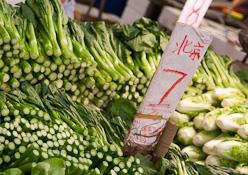
Over one third (37 per cent) of samples of organic vegetables sold in Hong Kong have tested positive for pesticide residues, the Consumer Council said this week.
Over 100 samples of vegetables, including 75 organic samples, were tested for residues of over 300 types of pesticides and seven types of heavy metals, the Hong Kong Economic Journal reported.
About 86 per cent of the choi sum samples and 73 per cent of the tomatoes were found to have residual pesticides, the highest proportion among the samples tested, the report said.
Cabbages and carrots had the least number of samples with pesticide residues.
A sample of sweet potato from a farm in Shandong province that had obtained EU organic certification contained 0.07 mg of chlorpyrifos per kilogram, exceeding the legal limit of 0.05 mg/kg.
A sample of organic carrot from the US was also found to have 0.09 mg of cadmium per kilogram, which is just a fraction shy of the legal limit 0.1 mg/kg.
A sample of string beans from mainland China was found to have 0.03 mg of chlorpyrifos per kilogram, which was three times the legal limit of 0.01 mg/kg, along with the presence of five other pesticides (including prochloraz at 4.74 mg/kg).
According to Consumer Council vice chairman Philip Leung Kwong-hon, US food and drug regulators require that the level of residual pesticides in vegetables be at least 5 per cent lower than the legal limits in order to be called organic.
Pesticide residues must also come from the environment and not from chemicals applied on plants and crops, he added.
Leung said Hong Kong does not have legal definitions to organic produce, and as such, no laws are violated if a vegetable sample is found to have excessive pesticides.
Lau Lai-kwan, from the Sustainable Ecological Ethical Development Foundation, said only organic pesticides made from plant extracts should be used in organic farming.
Any chemical pesticides, such as chlorpyrifos, should never be used in organic farming, and therefore should not be found in organic vegetables.
Secretary for Food and Health Ko Wing-man said authorities have been monitoring vegetables for residual pesticides in the past two years and vowed to step up spot checks.






No comments yet